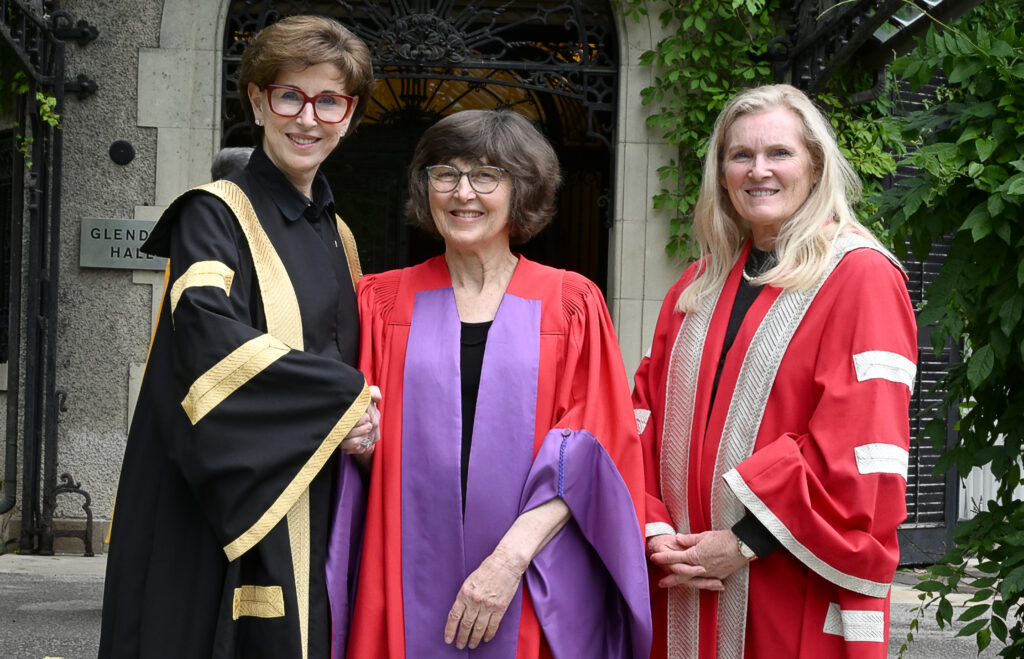During the June 7 convocation for York University’s Glendon College, award-winning researcher and social scientist Barbara Neis received an honorary degree and shared stories from her studies, career and life.
When University Secretariat Pascal Robichaud introduced Neis, she noted that the social scientist is “one of Glendon College’s most inspired and inspiring early graduates,” and can count herself as a member of the Order of Canada, a fellow of the Royal Society of Canada and a recipient of the Queen Elizabeth II Diamond Jubilee Medal.
Once Neis began addressing graduands, however, she recounted that before she was any of those things, she was a young student from a family farm in northern Ontario, arriving at Glendon College and experiencing urban and academic life for the first time.
As she pursued a joint undergraduate degree in sociology and psychology, Neis was introduced to disciplines and streams of thought she didn’t even know existed. The researcher admitted to graduands in her address that she was initially overwhelmed by the breadth of thinking she was exposed to, and how exactly to integrate any of into her life, career and academic pursuits. She worried about becoming a jack of all trades and master of none. “I was struggling with whether I could acquire even minimum expertise in philosophy, the humanities, sociology, psychology,” she said.

In time, however, an approach became clear to her. “I learned that I did not need to be an expert in everything,” she said. “It was enough to be able to read and respectfully engage with researchers in other disciplines who had a shared interest in answering relevant and important questions that could not be answered by drawing on the resources of a single discipline.”
That realization became the interdisciplinary bedrock of her career as a researcher and social scientist who has participated in research projects that total at least $150 million and whose work has been published in more than 120 books, book chapters, journal articles and working papers. It led to work promoting a greater understanding of the interactions between work environment, health and communities – especially within marine and coastal contexts.
Neis focused on the latter, especially while speaking to the graduands, recalling how that work began somewhat unexpectedly with a kitchen conversation in a home on the East Coast that she was visiting. There, she was told about trawlermen who were being severely injured as they tried to fish in ice in vessels not designed for that purpose. Neis wanted to know why, and in the process of getting answers developed an approach that would serve her well in understanding the roots of circumstances she wanted to research.
“The best way I’ve found to understand these forces is by starting with their lived experience and then using the resources available to researchers to work backwards to disentangle the various threads [that cause them],” she said.
In the case of the trawlermen, the source of the challenges they faced became clear. “I soon realized that for fishermen and others, the forces that threaten their lives, livelihoods and communities frequently come from the ways environmental, institutional, policy and other processes intersect to affect what they do and how they do it,” she said.
It became important to Neis then – and moving forward – to keep the people in mind while conducting her research. “It led me to begin designing my research, assessing the findings and developing related recommendations for change in collaboration with those who must, in the end, live with the results.”
She would go on to approach her other work with that same type of thinking – notably, her research around the collapse of the Atlantic cod stocks in the 1990s. As Robichaud noted in his introduction, that work “made [Neis’s] reputation as a research activist … [and] … led to significant social change.”
Neis credits the success of that project to remembering the personal, and listening to lived experiences when doing research. “I was privileged to work with a team of social and natural scientists, interviewing Trinity Bay fishermen about their intimate knowledge of life under and on the water,” she said. “Their collective observations, from headland to the bottom of the bay and across generations, helped us document the insights underlying their prescient questioning of the overly optimistic scientific assessments that contributed to the collapse.”
That experience – which she noted proudly was some of the earliest research globally on commercial fisheries, ecological knowledge and science – gave her the tools to “lead interdisciplinary programs of research that sought to explore key knowledge gaps at the boundaries not only between the social sciences but also between the social, natural and health sciences.”
Neis shared that her interest in the interdisciplinary also extends beyond the academic. She recalled that after moving on from an early love of creative pursuits, when she later in life moved to Newfoundland, she had access to a vibrant artistic community that was both socially and politically engaged. There, she began collaborating with that community to create projects that address climate change in the coastal regions. “These effects are already part of the lived experience of those living on islands and along coasts – including, particularly, in the Arctic. Our objective … is to explore how to use the arts to emotionally engage new audiences and empower essential movements for social change,” she said.
It is perhaps no surprise, given her career built on being open to unexpected sources of direction, that Neis shared a critical piece of advice drawn from her experiences – many of which she had never anticipated. “This reminds us how important it is to look for opportunities and to embrace change that takes us outside of our comfort zone,” she told the graduands, summing up both her own life and inspiring the ones ahead for those graduating.


